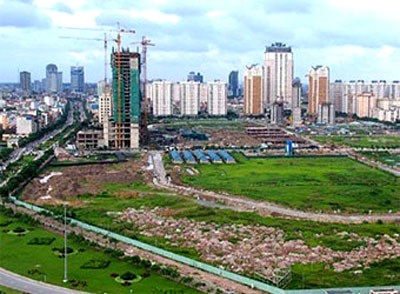(VOVworld)- Deputies to the 5th session of the 13th National Assembly spent a whole day on Monday discussing the revised Land Law before ratifying it. The draft revisions aim to harmoniously ensure the interests of the State and people.
According to the deputies, the revised Land Law addressed shortcomings of the current law on issues concerning land use, compensation, clearance, and prices and support for resettlement. The draft revisions aim to balance interests of the state and people whose land is revoked and to make land resource an important motivation for socio-economic development. Nguyen Thanh Thuy, a deputy from Binh Dinh province, supported changes in the law because they correspond with national and public interest, security, and socio-economic development projects. Thuy says: “In cases relating to land acquisition for socio-economic development projects, we need to work out a tighter framework to make sure that these projects serve national and public interests. Meanwhile, development investors need to negotiate with land users in accord with land use regulations”.
 |
Some deputies stressed the need to ensure that land acquisition not conflict with people’s lives to avoid land related complaints and denunciations and land wastefulness. They urged the compiling committee to thoroughly study this issue to ensure sustainability and stability for the economy.
Some deputies proposed more drastic changes to regulations on land compensation and support for resettlement. They said it is necessary to pay more attention to ensuring livelihood for resettled people whose land is revoked by the State. Tran Ngoc Vinh, a deputy from Hai Phong, says:“The compiling committee needs to work out a specific price mechanism plot by plot, house by house. People will not have to pay any more money for resettlement but also receiving State support to rebalance their lives. We have to raise the compensation for farmers whose agricultural land is revoked and provide them with vocational training. It is necessary to work out a mechanism for buying land use rights and for negotiations on land compensation prices between enterprises and people”.
Though the compiling committee has a separate article stipulating the pricing principle, the price table and specific prices, some deputies said that these changes are not breakthrough and more specific regulations should be worked out. Deputy Ngoc Vinh says: “Regulations on land prices need to ensure the legal interests between the State, enterprises and people. It is necessary to set up a legally bound authority agency to independently determine the land prices. We also need to work out a mechanism of negotiation on land issues between enterprises and people”.
Some deputies agreed that the land use plans should be made at three levels: national, provincial and district levels while some wanted to maintain the current 4 levels: national, provincial, district and communal levels. Bui Van Phuong, a deputy from Ninh Binh province, says: “We need to get the communal authority involved in the land use planning as stipulated in the current law because land use plans must match with local socio-economic development plan and national security. Communal authority is a functional administration, which steers the implementation of the 5-year and annual socio-economic development plans. To this end, communal authorities need to make appropriate land use plans. In addition, communal authorities make detailed plans on land use based on the district master plan, so there will be cohesion between these plans”.
Land Law is important because it is closely associated with people’s interests. The revisions to the Land Law are aimed at contributing to the effective use and management of the land resource while harmonizing the interests between the State and people.